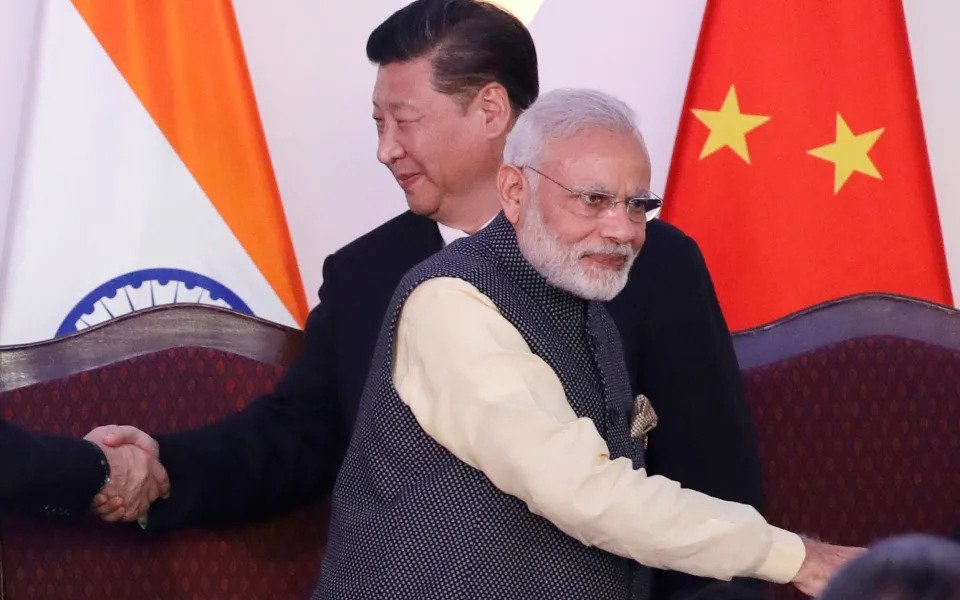Investors favour India over China as world’s second biggest economy stutters
Tim Wallace
23 December 2023·

Xi Jinping, the president of China, and Narendra Modi, India's prime minister - MANISH SWARUP/AP
The world’s biggest sovereign wealth funds and public pension schemes are backing India over China as fears grow over Beijing’s interventions in companies operating in the region.
India is the most popular emerging market with investors, favoured by two-fifths of the 100 funds surveyed by the Official Monetary and Financial Institutions Forum (OMFIF), a think tank.
China won the backing of less than a quarter of the managers, putting it on a par with Brazil in joint-second place.
It means China risks losing out on capital from some of the most powerful investors in the world with the funds surveyed having a combined financial firepower of $25.9 trillion (£20.5 trillion).
Almost three-quarters said they are put off investing in China by the regulatory environment, with the same share blaming geopolitical factors.
The biggest remaining reason to put money into China is for diversification of investments, and because the country is included in benchmark indices. This means fund managers investing in emerging market trackers have exposure to China by default, rather than making an active decision to back the nation.
In contrast to previous years’ surveys, not a single fund said it is investing in China with the expectation of higher relative returns, because of the increasing importance of the country in the global economy, or because it has a positive outlook for Chinese growth.

China belatedly lifted strict Covid restrictions - TAO MING/XINHUA
At the start of 2023, economists had hoped for a strong rebound from China as authorities in Beijing belatedly ditched their strict Covid lockdown measures.
But instead the property crisis has deepened and growth has disappointed, deterring investors.
Craig Thorburn, a director of Future Fund, which manages Australia’s wealth, said it is cutting back on investment in China.
In a submission to OMFIF he said: “We reduced our exposure to China, reflecting increased intervention in market sectors and the accumulation of challenges to their economic growth model.”
Nikhil Sanghani at OMFIF, said large, long-term funds will not typically liquidate their investments overnight, but are now likely to make fewer new investments in China.
He added: “What is interesting is the shift in tone. It is all about intentions. They are becoming more hesitant or cautious on China. It tallies up with the general mood in financial markets more broadly towards China.
“They are long-term players, they are looking very strategically at their long-term investments, so I doubt this means they will pull their money out of China immediately. It is more likely that if they are going to allocate towards emerging markets, it looks like that is going to be towards India rather than China right now.”
India is soon going to benefit from more passive investment inflows as its government debt will be added to JP Morgan’s emerging markets government bond index from June, automatically reallocating more international cash to the country.
Mr Sanghani said that India’s economy has remained solid even as China’s has slowed, making the country relatively more attractive to international money.
“Because of these structural headwinds you are seeing in China and its economy, because of some of the geopolitical tensions, in a relative sense India is starting to look a bit more appealing,” he said.
“It is not like things in India have been standing still. I think there are areas where things seem to be opening up to foreign investors.”
This includes improving liquidity in bond markets to gain a place in the JP Morgan index.
He expects pension money to become particularly important to future economic growth as governments around the world have major schemes in mind but have little fiscal headroom to finance their plans.
Mr Sanghani said: “I think [these funds] have a massive role to play. We see across the world right now that, frankly, there isn’t the fiscal space to do a lot.
“Particularly on these big issues around the energy transition for example, there is limited fiscal space.”
He pointed to the German government’s green spending plans which have been shot down by the constitutional court, while in the UK the Government is trying to enlist pension funds to invest more in Britain.
Mr Sanghani added: “There is an increasing onus for probably the public sector to try and make sure they are better mobilising either their existing pools of capital with their domestic pension funds or sovereign funds, but also trying to become more open to that foreign investment.”
Losing access to some of these international funds will be damaging to China’s economy at a time when it is already struggling to regain its pre-Covid momentum.
India’s economy is on track to out-grow China’s for the third consecutive year and, according to predictions from the International Monetary Fund, will keep doing so in every one of the five years of its forecast.
India’s stock market capitalisation is also gaining on China’s, according to Tim Hayes at Ned Davis Research, as the country gains on its bigger rival and draws in more international cash.
He said: “India’s demographic outlook and long-term growth potential are both far better than China’s.”
No comments:
Post a Comment